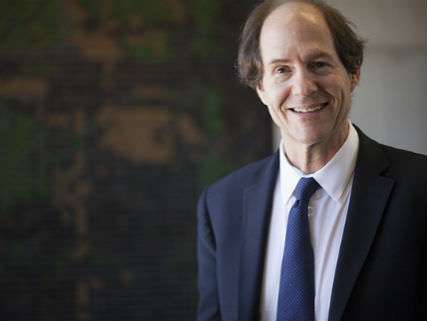A Paternalist Worries About Paternalism

Harvard law professor Cass Sunstein, who advocates "libertarian paternalism" in his book Nudge (co-authored by University of Chicago economist Richard Thaler), worries about the consequences of inviting the government to protect us from ourselves in a recent New York Review of Books essay. Sunstein agrees with Bowdoin philosopher Sarah Conly, author of Against Autonomy: Justifying Coercive Paternalism, that people are prone to cognitive biases that lead to decisions they regret:
For example, many of us show "present bias": we tend to focus on today and neglect tomorrow. For some people, the future is a foreign country, populated by strangers. Many of us procrastinate and fail to take steps that would impose small short-term costs but produce large long-term gains. People may, for example, delay enrolling in a retirement plan, starting to diet or exercise, ceasing to smoke, going to the doctor, or using some valuable, cost-saving technology. Present bias can ensure serious long-term harm, including not merely economic losses but illness and premature death as well.
But while Sunstein wants to help people achieve their own goals through relatively mild interventions, such as displaying fruit more conspicuously in cafeterias and making 401(k) participation automatic unless employees opt out, Conly believes sterner measures, including outright prohibition, are sometimes justified. She sees New York City's ban on trans fats in restaurant dishes as a model of effective paternalism, and she favors government-mandated limits on food portions. At the same time, she is "ambivalent" about preventing people from using food stamps to buy soda: "She is not convinced that the health benefits would be significant, and she emphasizes that people really do enjoy drinking soda." Her "most controversial claim," Sunstein says, is that the benefits of banning cigarettes would outweigh the costs. Sunstein is appropriately skeptical:
Any ban would raise exceedingly serious difficulties, not least because it would be hard to enforce. A full analysis would have to consider such difficulties, as well as the claims of free choice. Black markets in cigarettes are not exactly what the United States most needs now.
So here we have two smart and thoughtful people who disagree about the net impact of cigarette prohibition. Is there any reason to think this dispute can ever be definitively resolved, or that if it could legislators would choose the correct policy? The history of drug prohibition—which Sunstein conspicuously fails to mention, even when citing examples of current policies that are defended on paternalistic grounds—suggests it is unrealistic to expect the government to meddle in people's lives based on a careful, rational appraisal of costs and benefits. Even if people like Conly and Sunstein were in charge, they would find, as the technocratic authors of Marijuana Legalization: What Everyone Needs to Know discovered, that value judgments are unavoidable in assessing the merits of using force to stop people from doing things that might harm them.
Sunstein notes some other problems with utilitarian-minded paternalism. Conly says the government's interventions should serve people's interests as they themselves perceive them, presumably in retrospect or upon careful reflection. But "the line between means and ends can be fuzzy," Sunstein says, "and there is a risk that well-motivated efforts to promote people's ends will end up mischaracterizing them." After all, a big part of the utilitarian case against paternalism is that people, by and large, are the best judges of their own interests; that is, they understand those interests better than an outside observer possibly can. While the observer sees you order dessert and thinks you will regret it, he could be wrong; perhaps the pleasure of that dessert, given your tastes and preferences, outweighs any long-term impact on your waistline or health. It is folly to think that a government-appointed guardian can do a better job of assessing such matters than you can. It is even more fanciful to suppose that a top-down, one-size-fits-all policy, such as taxing, rationing, or banning desserts, could ever achieve the right balance, assuming that such a thing could be calculated. The problem is akin to centrally planning an economy, except that the goal, instead of balancing supply and demand, is to maximize human happiness. As Sunstein observes, "Freedom of choice is an important safeguard against the potential mistakes of even the most well-motivated officials."
Another objection to Conly's ambitious nanny state agenda, Sunstein writes, is that "autonomy is an end in itself and not merely a means." When it comes to how people feel about their lives, they may well prefer to make their own mistakes rather than have better decisions imposed upon them. Conly does take that preference into account, Sunstein says, but as "merely one consideration among many" in her cost-benefit analysis: "If a paternalistic intervention would cause frustration, it is imposing a cost, and that cost must count in the overall calculus."
The implication is that the government should treat grown men and women the way a parent treats a child who wants a piece of cake before dinner. Anticipation of the child's complaints is a consideration when the parent decides whether to intervene, but it is not necessarily decisive. While it is reasonable to credit the parent in that situation with superior knowledge, foresight, and wisdom, it is not safe to make such an assumption about government, which consists of the same fallible creatures whose frequent errors are said to justify oversight of their personal habits. If Sarah Conly can't be trusted to decide how much to eat, whether to consume products that contain trans fats, or whether to smoke cigarettes, how can she be trusted to make such decisions for the entire population?
I surveyed the wide-ranging agenda of public-health paternalism in the May 2007 issue of Reason.


Show Comments (139)